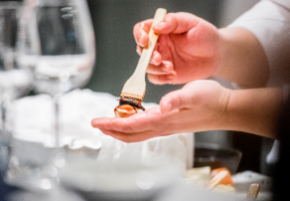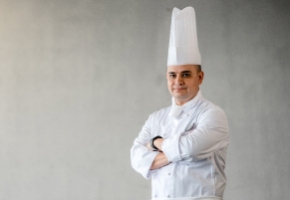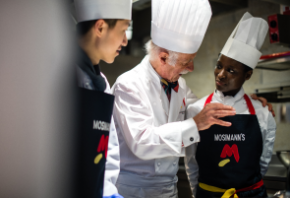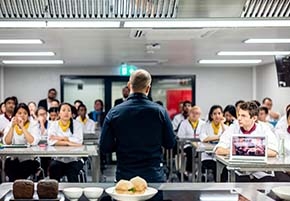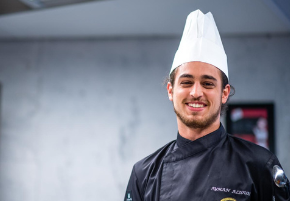- About
- Programs
- Campus Life
- Career Services
- Admissions
- News & Events
- Alumni
How to Become a Baker: Training, Experience, and Roles
Want to turn your passion into a profession? Here's how to become a baker and build a rewarding career through training, skills, and certifications.
Key Takeaways
- A baker is a culinary professional who combines technical skill and creativity to produce baked goods while balancing both the artistry and discipline of the craft.
- Bakers specialize in different areas, from artisan bread makers to pastry chefs, commercial bakers, and niche experts focusing on unique products or dietary needs.
- Becoming a baker requires structured learning, with education, hands-on training, and industry experience providing the foundation for long-term success.
- Career advancement is wide-ranging, with opportunities to move into leadership roles, launch a bakery business, or pursue international positions across hospitality.
The comfort of walking past a bakery often begins with the smell alone. Freshly baked bread and warm pastries have a way of creating instant joy, even before a single bite is taken.
For many, baking feels simple—flour, water, and heat transformed into something delicious. Yet that sense of simplicity is an illusion. The reality of being a baker involves technique and discipline that most people never see.
Recognizing the depth of this craft is the first step in understanding how to become a baker.
Understand the Role of a Baker
A baker is a culinary professional whose work blends tradition, technique, and creativity. The role carries both cultural and practical importance, since bread and baked goods are staples in nearly every cuisine.
Bakers are often seen as part of the daily rhythm of a community, providing products that range from simple necessities to specialty creations. Their profession demands commitment to consistency and quality while also leaving room for artistry that distinguishes one bakery or product from another.
Daily responsibilities
Professional bakers typically start work early, often beginning shifts between 3 and 6 AM to prepare fresh products for morning customers. Some of their core responsibilities include:
- Measuring and mixing ingredients according to precise recipes
- Operating commercial ovens, mixers, and specialized equipment
- Monitoring baking times and temperatures for consistent results
- Decorating cakes, pastries, and specialty items
- Maintaining strict food safety and sanitation standards
- Managing inventory and ordering supplies
Types of bakers
The title "baker" can mean many different things depending on the products being made and the setting where the work takes place. Different paths within the profession highlight unique skills and areas of focus:
- Artisan bakers focus on handcrafted breads and traditional techniques, often working in smaller bakeries that emphasize quality ingredients and heritage methods.
- Pastry chefs specialize in desserts, cakes, and sugar-based creations, usually in restaurants, hotels, or high-end bakeries where artistic presentation is essential.
- Commercial bakers operate in large-scale production environments, supplying breads and baked goods for grocery chains, restaurants, or catering services.
- Specialty bakers dedicate themselves to niche products such as wedding cakes, gluten-free items, or cultural specialties, with many running independent businesses.
How to Become a Baker
Becoming a professional baker requires more than enthusiasm for baking. It is a process built step by step, with each stage laying the groundwork for a lasting culinary career.
While there are different ways to enter the field, pursuing a path that emphasizes structured education and hands-on training provides one of the most reliable routes to long-term success.
Start Your Culinary Journey
Learn the art of cooking in a world-class environment
1. Get a high school diploma or equivalent
This basic requirement provides entry into culinary programs and apprenticeships. Subjects often overlooked in high school can prove highly valuable to aspiring bakers. Some such subjects are:
- Mathematics: Supports recipe scaling, portioning, and cost management.
- Business: Prepare you for entrepreneurship or supervisory roles.
- Chemistry: Builds understanding of ingredient interactions during baking.
- Languages: Expand international career opportunities.
A strong educational foundation demonstrates readiness for further training and professional development.
2. Choose your educational path
The real transformation into a professional baker begins with specialized training, and there are several paths to take depending on your goals. Culinary school programs remain one of the strongest options, as they provide comprehensive instruction in baking techniques, food science, and business foundations.
At Culinary Arts Academy Switzerland (CAAS), for example, the Swiss Diploma in Pastry Arts offers intensive, hands-on training with expert chefs. Students master traditional Swiss and European pastry methods as well as explore modern innovations. This prepares them for leadership roles in luxury kitchens around the world.
For those seeking a broader foundation, undergraduate and postgraduate options such as the Bachelor of Arts in Culinary Arts or the Master of Arts in Culinary Business Management combine advanced culinary expertise with business knowledge, opening doors to careers in management, entrepreneurship, and beyond.
Other pathways also exist for aspiring bakers. Vocational training programs deliver concentrated, practical education within shorter timeframes and are often closely connected to local employers. Apprenticeships provide another valuable route, offering the chance to earn while learning under experienced professionals and gaining direct exposure to the realities of professional baking.
The career of Danna Vu, an alumna of Culinary Arts Academy Switzerland, illustrates how far these opportunities can go. Since graduating, she has completed an apprenticeship with the “World's Best Pastry Chef, baked cookies for President Obama, and is preparing to represent Sweden in the upcoming Culinary World Cup.
3. Gain hands on experience
Baking is a profession defined by practice. Real growth comes from time spent in professional kitchens, where skills are tested under pressure. Internships arranged through culinary schools give students structured experience and industry exposure, while entry-level roles such as baker's assistant or prep cook provide income and practical training.
At CAAS, students benefit from the International Recruitment Forum (IRF), where top hospitality employers—ranging from luxury hotels to renowned bakeries—recruit directly on campus. These opportunities give students access to premium internships and job placements that help them advance much faster in their careers.
4. Develop essential baking skills
Professional baking requires mastering both technical and soft skills that ensure consistent, high-quality results.
Some of the technical skills required for the role include:
- Dough handling techniques for bread, pastries, and specialty items
- Temperature control and timing for optimal baking results
- Cake decorating and artistic presentation methods
- Food safety protocols and sanitation standards
- Equipment operation and maintenance
Those technical skills are most effective when combined with the following soft skills:
- Time management for early morning schedules and tight deadlines
- Creativity in developing new recipes and presentation styles
- Teamwork and communication in fast-paced kitchen environments
- Problem-solving when recipes don't perform as expected
5. Consider professional certification
Professional certifications validate your expertise and commitment to industry standards. Specialized areas such as chocolate work, sugar artistry, or allergen-friendly baking enhance employability and set candidates apart in competitive markets.
Graduates from accredited programs like CAAS already receive internationally recognized diplomas, which generally satisfy certification standards as they demonstrate training from one of the world's leading culinary institutions.
Career Advancement for Bakers
The baking industry opens up a wide range of opportunities for professional growth. Progress often comes through developing specialized skills, taking on leadership responsibilities, and establishing a strong reputation within the field.
Bakers with experience and training can move into positions such as:
- Head baker or pastry chef
- Bakery or pastry department manager
- Product development specialist in commercial baking
- Culinary instructor in pastry and baking schools
Many professionals even aim for ownership. Starting a baking business represents the ultimate entrepreneurial ambition, combining technical expertise with business knowledge. Others may pursue specialty consulting, offering guidance on recipe development, equipment selection, or production efficiency for businesses seeking expert insight.
The industry also provides global possibilities for those with formal training. Alumni of CAAS work in Michelin-starred restaurants, luxury hotel groups, and international patisseries. Some achieve recognition on the world stage. Kristin Hamberg, for example, earned a gold medal at the Culinary Olympics as part of the Swedish team. Reflecting on her career, she credits much of her success to her year at CAAS:
As a young girl in the industry, trying to achieve your goals can be quite intimidating. However, taking that first step, going to Switzerland and studying at CAAS really pushed me in the right direction. After that, I thought, 'While I'm on this roll, I can just keep on going!'
Her story is proof of how advanced training, international exposure, and determination can turn the skills of a baker into a career that reaches even beyond the kitchen.
Ready to Heat Up the Ovens?
Bakers combine creativity with precision and tradition with innovation. Their expertise balances both the art and the science of food in order to turn simple ingredients into creations that inspire delight and connection.
With the right education, hands-on practice, and dedication to continuous growth, you can build a career in baking that sustains you as well as brings joy to others through baked goods.
For those seeking the strongest foundation and the greatest opportunities for advancement, Culinary Arts Academy Switzerland offers world-class training, global industry connections, and an environment where passion becomes a profession. So, join our programs and let your career rise as surely as the breads and pastries you create.
Frequently Asked Questions
How long does it take to become a baker?
Entry-level positions can be obtained in 6-18 months through vocational training or apprenticeships, while specialized roles like pastry chef typically require 2-4 years of combined education and experience.
How difficult is it to become a baker?
Professional baking requires mastering precise techniques and working demanding early-morning schedules, but offers creative satisfaction and stable career opportunities for dedicated individuals willing to develop their skills through practice and continuous learning.
Interested in studying at CAAS? Download our brochure to learn about our programs!


